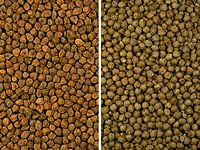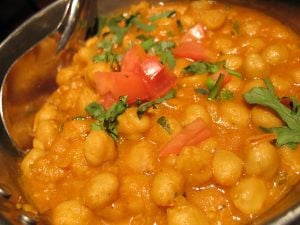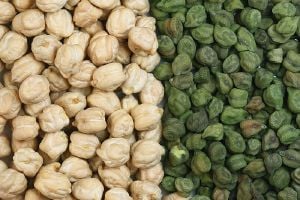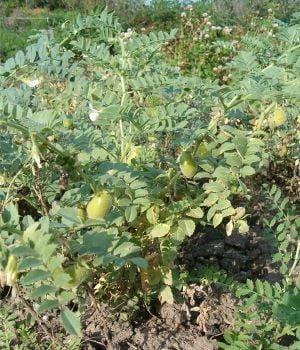Difference between revisions of "Chickpea" - New World Encyclopedia
Rick Swarts (talk | contribs) (added article from Wikipedia and credit/category tag) |
Rick Swarts (talk | contribs) |
||
| Line 14: | Line 14: | ||
| binomial_authority = [[Carolus Linnaeus|L.]] | | binomial_authority = [[Carolus Linnaeus|L.]] | ||
}} | }} | ||
| − | + | '''Chickpea''' is the common name for an annual [[plant]], '''''Cicer arietinum''''', of the Fabaceae (or Leguminosae) family that is widely cultivated for its yellow-brown, [[pea]]-like [[seed]]s. The name also is used for these edible seeds, which form in short pods and are popular in various cuisines. Other common names for this seed are '''garbanzo bean''', '''Indian pea''', '''ceci bean''', '''bengal gram''', '''chana''', '''kadale kaalu''', '''sanaga pappu''', and '''shimbra'''. | |
| − | |||
| − | |||
| − | |||
| − | |||
| − | |||
| − | |||
| − | Chickpeas are | + | Chickpeas are high in protein (for a plant), and one of the earliest cultivated vegetables. 7,500-year-old remains have been found in the Middle East.<ref>[http://www.forward.com/articles/chickpeas/ "Chickpeas - Forward.com"<!-- Bot generated title —>]</ref> |
| − | + | ==Overview and Description== | |
| − | |||
| − | ==Description== | ||
[[Image:Sa-whitegreen-chickpea.jpg|thumb|White and green chickpeas]] | [[Image:Sa-whitegreen-chickpea.jpg|thumb|White and green chickpeas]] | ||
[[Image:2005chickpea.PNG|thumb|Chickpea output in 2005]] | [[Image:2005chickpea.PNG|thumb|Chickpea output in 2005]] | ||
[[Image:Cicer arietinum HabitusFruits BotGardBln0906a.jpg|thumb|Flowering chickpea plant]] | [[Image:Cicer arietinum HabitusFruits BotGardBln0906a.jpg|thumb|Flowering chickpea plant]] | ||
| + | |||
| + | Chickpea, ''Cicer arietinum'', is a member of the legume, pea, or pulse family, ''''Fabaceae''. Also called ''Leguminosae'', this family of [[flowering plant]]s is one of the largest plant families and include s such important plants as [[bean]]s, [[pea]]s, [[peanut]]s, lupines, [[alfalfa]], [[clover]], and [[acacia]], and many others. | ||
| + | |||
| + | |||
| + | |||
| + | |||
| + | |||
The plant grows to between 20 and 50 cm high and has small feathery leaves on either side of the stem. One seedpod contains two or three peas. The flowers are white or sometimes reddish-blue. Chickpeas need a subtropical or tropical climate with more than 400 mm of annual rain. They can be grown in a temperate climate but yields will be much lower. | The plant grows to between 20 and 50 cm high and has small feathery leaves on either side of the stem. One seedpod contains two or three peas. The flowers are white or sometimes reddish-blue. Chickpeas need a subtropical or tropical climate with more than 400 mm of annual rain. They can be grown in a temperate climate but yields will be much lower. | ||
| Line 38: | Line 37: | ||
*Kabuli, which has lighter coloured, larger seeds and a smoother coat, mainly grown in Southern Europe, Northern Africa, [[Afghanistan]] and [[Chile]], also introduced during the 18th century to the Indian subcontinent)"<ref>Mansfeld's World Database of Agricultural and Horticultural Crops, ''[http://mansfeld.ipk-gatersleben.de/pls/htmldb_pgrc/f?p=185:46:2650767499563036::NO::module,source,taxid,akzname:mf,volksnam,30808,Cicer%20arietinum%20subsp.%20arietinum Cicer arietinum subsp. arietinum ]'', retrieved 31 January 2008</ref> | *Kabuli, which has lighter coloured, larger seeds and a smoother coat, mainly grown in Southern Europe, Northern Africa, [[Afghanistan]] and [[Chile]], also introduced during the 18th century to the Indian subcontinent)"<ref>Mansfeld's World Database of Agricultural and Horticultural Crops, ''[http://mansfeld.ipk-gatersleben.de/pls/htmldb_pgrc/f?p=185:46:2650767499563036::NO::module,source,taxid,akzname:mf,volksnam,30808,Cicer%20arietinum%20subsp.%20arietinum Cicer arietinum subsp. arietinum ]'', retrieved 31 January 2008</ref> | ||
The Desi (meaning ''country'' or ''local'' in [[Hindi]]) is also known as Bengal gram or kala chana. Kabuli (meaning ''from [[Kabul]]'' in [[Hindi]], since they were thought to have come from Afghanistan when first seen in India) is the kind widely grown throughout the Mediterranean. Desi is likely the earliest form since it closely resembles seeds found both on archaeological sites and the wild plant ancestor of domesticated chickpeas (''cicer reticulatum'') which only grows in southeast Turkey, where it is believed to have originated. Desi chickpeas have a markedly higher fiber content than Kabulis and hence a very low [[glycemic index]] which may make them suitable for people with blood sugar problems.<ref>Mendosa, David, ''[http://www.mendosa.com/chanadal.html Chana Dal]'', mendosa.com, retrieved 31 January 2008</ref> The desi type is used to make Chana Dal, which is a split chickpea with the skin removed. | The Desi (meaning ''country'' or ''local'' in [[Hindi]]) is also known as Bengal gram or kala chana. Kabuli (meaning ''from [[Kabul]]'' in [[Hindi]], since they were thought to have come from Afghanistan when first seen in India) is the kind widely grown throughout the Mediterranean. Desi is likely the earliest form since it closely resembles seeds found both on archaeological sites and the wild plant ancestor of domesticated chickpeas (''cicer reticulatum'') which only grows in southeast Turkey, where it is believed to have originated. Desi chickpeas have a markedly higher fiber content than Kabulis and hence a very low [[glycemic index]] which may make them suitable for people with blood sugar problems.<ref>Mendosa, David, ''[http://www.mendosa.com/chanadal.html Chana Dal]'', mendosa.com, retrieved 31 January 2008</ref> The desi type is used to make Chana Dal, which is a split chickpea with the skin removed. | ||
| + | |||
| + | |||
| + | |||
| + | ==Etymology== | ||
| + | The name ''chickpea'' traces back through the French ''chiche'' to Latin ''[[cicer]]'' (from which the Roman [[cognomen]] [[Cicero]] was taken). The word ''garbanzo'' comes from Old [[Spanish language|Spanish]] (perhaps influenced by Old Spanish ''garroba'' or ''algarroba'') through ''arvanço'' which may be linked to the Greek ''erebinthos''.<ref>dictionary.reference.com, ''[http://dictionary.reference.com/search?q=garbanzo Garbanzo]'', retrieved 31 January 2008</ref> | ||
| + | |||
| + | ==History== | ||
| + | [[Neolithic founder crops|Domesticated]] chickpeas have been found in the aceramic levels of [[Jericho]] ([[Pre-Pottery Neolithic B|PPNB]]) along with [[Cayönü]] in Turkey and in [[Neolithic]] pottery at Hacilar, [[Turkey]]. They are found in the late Neolithic (about 3500 B.C.E.) at [[Thessaly]], [[Kastanas]], [[Lerna]] and [[Dimini]]. In southern France [[Mesolithic]] layers in a cave at L'Abeurador, [[Aude]] have yielded wild chickpeas [[radiocarbon dating|carbon dated]] to 6790±90 B.C.E.<ref>Zohary, Daniel and Hopf, Maria, ''Domestication of Plants in the Old World'' (third edition), Oxford University Press, 2000, p 110</ref> | ||
| + | |||
| + | By the [[Bronze Age]] chickpeas were known in [[Italy]] and [[Greece]]. In classical Greece they were called erébinthos and eaten as a staple, a dessert or consumed raw when young. The Romans knew several varieties such as venus, ram and punic chickpeas. They were both cooked down into a [[broth]] and roasted as a snack. The Roman gourmet [[Apicius]] gives several recipes for chickpeas. Carbonized chickpeas have been found at the Roman legion fort at [[Neuss]] (Novaesium), [[Germany]] in layers from the 1st century CE, along with rice. | ||
| + | |||
| + | Chickpeas are mentioned in [[Charlemagne]]'s ''Capitulare de villis'' (about 800 C.E.) as ''cicer italicum'', as grown in each [[manorialism|imperial demesne]]. [[Albertus Magnus]] mentions red, white and black varieties. [[Nicholas Culpeper|Culpeper]] noted "chick-pease or cicers" are less "[[flatulence|windy]]" than peas and more nourishing. Ancient people also associated chickpeas with [[medical astrology|Venus]] because they were said to offer medical uses such as increasing sperm and milk, provoking menstruation and urine and helping to treat [[kidney stone]]s. Wild cicers were thought to be especially strong and helpful. | ||
| + | |||
| + | Chickpeas were grown in some areas of Germany as a [[coffee]] substitute called chickamuddle during the [[World War I|First World War]] {{Fact|date=March 2008}}. | ||
| + | |||
==Cultivation and use== | ==Cultivation and use== | ||
Revision as of 00:17, 3 August 2008
| Chickpea | ||||||||||||||||
|---|---|---|---|---|---|---|---|---|---|---|---|---|---|---|---|---|
 Left: Bengal variety; right: European variety
| ||||||||||||||||
| Scientific classification | ||||||||||||||||
| ||||||||||||||||
| Cicer arietinum L. |
Chickpea is the common name for an annual plant, Cicer arietinum, of the Fabaceae (or Leguminosae) family that is widely cultivated for its yellow-brown, pea-like seeds. The name also is used for these edible seeds, which form in short pods and are popular in various cuisines. Other common names for this seed are garbanzo bean, Indian pea, ceci bean, bengal gram, chana, kadale kaalu, sanaga pappu, and shimbra.
Chickpeas are high in protein (for a plant), and one of the earliest cultivated vegetables. 7,500-year-old remains have been found in the Middle East.[1]
Overview and Description
Chickpea, Cicer arietinum, is a member of the legume, pea, or pulse family, ''Fabaceae. Also called Leguminosae, this family of flowering plants is one of the largest plant families and include s such important plants as beans, peas, peanuts, lupines, alfalfa, clover, and acacia, and many others.
The plant grows to between 20 and 50 cm high and has small feathery leaves on either side of the stem. One seedpod contains two or three peas. The flowers are white or sometimes reddish-blue. Chickpeas need a subtropical or tropical climate with more than 400 mm of annual rain. They can be grown in a temperate climate but yields will be much lower.
Types
There are two main kinds of chickpea:
- Desi, which has small, darker seeds and a rough coat, cultivated mostly in the Indian subcontinent, Ethiopia, Mexico and Iran.
- Kabuli, which has lighter coloured, larger seeds and a smoother coat, mainly grown in Southern Europe, Northern Africa, Afghanistan and Chile, also introduced during the 18th century to the Indian subcontinent)"[2]
The Desi (meaning country or local in Hindi) is also known as Bengal gram or kala chana. Kabuli (meaning from Kabul in Hindi, since they were thought to have come from Afghanistan when first seen in India) is the kind widely grown throughout the Mediterranean. Desi is likely the earliest form since it closely resembles seeds found both on archaeological sites and the wild plant ancestor of domesticated chickpeas (cicer reticulatum) which only grows in southeast Turkey, where it is believed to have originated. Desi chickpeas have a markedly higher fiber content than Kabulis and hence a very low glycemic index which may make them suitable for people with blood sugar problems.[3] The desi type is used to make Chana Dal, which is a split chickpea with the skin removed.
Etymology
The name chickpea traces back through the French chiche to Latin cicer (from which the Roman cognomen Cicero was taken). The word garbanzo comes from Old Spanish (perhaps influenced by Old Spanish garroba or algarroba) through arvanço which may be linked to the Greek erebinthos.[4]
History
Domesticated chickpeas have been found in the aceramic levels of Jericho (PPNB) along with Cayönü in Turkey and in Neolithic pottery at Hacilar, Turkey. They are found in the late Neolithic (about 3500 B.C.E.) at Thessaly, Kastanas, Lerna and Dimini. In southern France Mesolithic layers in a cave at L'Abeurador, Aude have yielded wild chickpeas carbon dated to 6790±90 B.C.E.[5]
By the Bronze Age chickpeas were known in Italy and Greece. In classical Greece they were called erébinthos and eaten as a staple, a dessert or consumed raw when young. The Romans knew several varieties such as venus, ram and punic chickpeas. They were both cooked down into a broth and roasted as a snack. The Roman gourmet Apicius gives several recipes for chickpeas. Carbonized chickpeas have been found at the Roman legion fort at Neuss (Novaesium), Germany in layers from the 1st century CE, along with rice.
Chickpeas are mentioned in Charlemagne's Capitulare de villis (about 800 C.E.) as cicer italicum, as grown in each imperial demesne. Albertus Magnus mentions red, white and black varieties. Culpeper noted "chick-pease or cicers" are less "windy" than peas and more nourishing. Ancient people also associated chickpeas with Venus because they were said to offer medical uses such as increasing sperm and milk, provoking menstruation and urine and helping to treat kidney stones. Wild cicers were thought to be especially strong and helpful.
Chickpeas were grown in some areas of Germany as a coffee substitute called chickamuddle during the First World War [citation needed].
Cultivation and use
Chickpeas are grown in the Mediterranean, western Asia and the Indian subcontinent. Domestically they can be sprouted within a few days all year round with a sprouter on a windowsill.
Mature chickpeas can be cooked and eaten cold in salads, cooked in stews, ground into a flour called gram flour (also known as besan and used primarily in Indian cuisine), ground and shaped in balls and fried as falafel, fermented to make an alcoholic drink similar to sake, stirred into a batter and baked to make farinata, cooked and ground into a paste called hummus or roasted, spiced and eaten as a snack (such as leblebi). Chick peas and bengal grams are used to make curries and are one of the most popular vegetarian foods in India, Pakistan, Bangladesh and the UK. On the Indian subcontinent chickpeas are called kadale kaalu (Kannada), chana (Hindi and other Indic languages),Chhola(Bengali), konda kadalai or pothu kadalai (Tamil), where they are a major source of protein in a mostly vegetarian culture.

Many popular Indian dishes are made with chickpea flour, such as mirchi bajji and mirapakaya bajji telugu. In India unripe chickpeas are often picked out of the pod and eaten as a raw snack and the leaves are eaten as a green vegetable in salads. Chickpea flour is also used to make "Burmese tofu" which was first known among the Shan people of Burma. The flour is also used as a batter to coat various vegetables and meats before frying, such as with panelle, a chickpea fritter from Sicily.[6] In the Philippines garbanzo beans preserved in syrup are eaten as sweets and in desserts such as halo-halo. Ashkenazi Jews traditionally serve whole chickpeas at a Shalom Zachar celebration for baby boys. [7]
Dried chick peas need a long cooking time (1-2 hours) but will not easily fall apart when cooked longer. If soaked for 12-24 hours before use, cooking time can be considerably shortened (30 mins).
Production
India is the world leader in chickpea production followed by Pakistan and Turkey.
Nutrition
| Chickpeas, mature seeds, cooked no salt Nutritional value per 100 g | |||||||||||||||||||||||||||||||||||||||||||||||||
|---|---|---|---|---|---|---|---|---|---|---|---|---|---|---|---|---|---|---|---|---|---|---|---|---|---|---|---|---|---|---|---|---|---|---|---|---|---|---|---|---|---|---|---|---|---|---|---|---|---|
| Energy 160 kcal 690 kJ | |||||||||||||||||||||||||||||||||||||||||||||||||
| |||||||||||||||||||||||||||||||||||||||||||||||||
| Percentages are relative to US recommendations for adults. Source: USDA Nutrient database | |||||||||||||||||||||||||||||||||||||||||||||||||
Chickpeas are a helpful source of zinc, folate and protein.[8][9] They are also very high in dietary fiber and hence a healthy source of carbohydrates for persons with insulin sensitivity or diabetes. Chickpeas are low in fat and most of this is polyunsaturated.
One hundred grams of mature boiled chickpeas contains 164 calories, 2.6 grams of fat (of which only 0.27 grams is saturated), 7.6 grams of dietary fiber and 8.9 grams of protein. Chickpeas also provide dietary calcium (49-53 mg/100 g), with some sources citing the garbanzo's calcium content as about the same as yogurt and close to milk. According to the International Crops Research Institute for the Semi-Arid Tropics chickpea seeds contain on average:
- 23% protein
- 64% total carbohydrates (47% starch, 6% soluble sugar)
- 5% fat
- 6% crude fiber
- 3% ash
There is also a high reported mineral content:
- phosphorus (340 mg/100 g)
- calcium (190 mg/100 g)
- magnesium (140 mg/100g)
- iron (7 mg/100 g)
- zinc (3 mg/100 g)
ReferencesISBN links support NWE through referral fees
- ↑ "Chickpeas - Forward.com"
- ↑ Mansfeld's World Database of Agricultural and Horticultural Crops, Cicer arietinum subsp. arietinum , retrieved 31 January 2008
- ↑ Mendosa, David, Chana Dal, mendosa.com, retrieved 31 January 2008
- ↑ dictionary.reference.com, Garbanzo, retrieved 31 January 2008
- ↑ Zohary, Daniel and Hopf, Maria, Domestication of Plants in the Old World (third edition), Oxford University Press, 2000, p 110
- ↑ foodnetwork.com http://www.foodnetwork.com/food/recipes/recipe/0,1977,FOOD_9936_24327,00.html Chickpea Fritters: Panelle, retrieved 31 January 2008
- ↑ Chickpeas Garbanzo Beans Hummus Falafel
- ↑ www.vegsoc.org, Zinc, retrieved 31 January 2008
- ↑ www.vegsoc.org, Protein, retrieved 31 January 2008
See also
- Hummus
- Gram flour
External links
- History and nutrition of Chickpeas, Casa Angola Internacional, Portugal (in English)
Credits
New World Encyclopedia writers and editors rewrote and completed the Wikipedia article in accordance with New World Encyclopedia standards. This article abides by terms of the Creative Commons CC-by-sa 3.0 License (CC-by-sa), which may be used and disseminated with proper attribution. Credit is due under the terms of this license that can reference both the New World Encyclopedia contributors and the selfless volunteer contributors of the Wikimedia Foundation. To cite this article click here for a list of acceptable citing formats.The history of earlier contributions by wikipedians is accessible to researchers here:
The history of this article since it was imported to New World Encyclopedia:
Note: Some restrictions may apply to use of individual images which are separately licensed.



